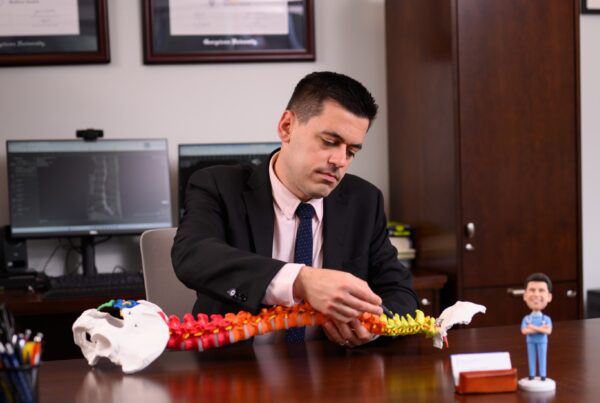If you’re preparing to undergo spinal tumor surgery, you probably have a million questions. It’s also likely that one of those questions topping your list is: How long will my recovery from spinal tumor surgery take?
Just as you’re an individual, your recovery will be, too. There are always factors that determine the speed of recovery from any procedure, but there is a basic timeline for spinal tumor surgery recovery that can provide you with some valuable information on what to expect, and when to expect it.
The Day of Your Surgery
Starting the moment your surgery is completed, recovery begins. Your body will begin rebuilding tissue, taking away the waste associated with healing and providing immune support for the affected areas. The surgery itself can take from one hour to 10, depending on the complexity of the tumor and any surrounding tissues it may have grown into. Your neurosurgeon can give you a more accurate estimate of how long your surgery is expected to last.
Once surgery is completed, you will be taken to a recovery area. Here you will be constantly monitored as you emerge from the anesthesia. Medications will be administered to control pain. When the surgical recovery staff is confident you are awake enough, you will be moved to your hospital room.
In many instances, patients are asked to get up and walk within hours of surgery. Do not attempt to get out of bed and walk on your own.
The Next Few Days
Although some spinal tumor surgery may only require two or three days in the hospital, it’s not uncommon to stay in the hospital for up to a week after undergoing surgery for an extensive tumor. During this time, you will have the opportunity to rest and really begin the healing process. Depending on the site and severity of your tumor, you may start receiving physical therapy. Pain management will be administered, but will be decreased on a daily basis as your body starts to recover.
Your surgeon may have placed a drain to divert excess fluid from the surgical site — within a few days of placement, this drain will be removed.
Going Home: The First Few Weeks
In most cases, you will go home within a week or less after your surgery, but sometimes a stay in an in-patient rehabilitation facility is needed. You might still be on pain medication for a few days to several weeks. It’s important to keep up with your medication schedule as laid out by your surgeon.
At home, you can gradually start to become more active — depending on your surgeon’s instructions, you may be asked to walk and build upon that base as recovery continues. In some cases physical therapy will be prescribed — be sure to attend all of the required sessions. This often makes a huge difference in recovery and helps to build strength and flexibility again.
A well-balanced diet is essential in giving your body the nutrients it needs to properly heal. Plenty of vegetables and fruits, a moderation of lean meats and healthy carbs will help give your system the boost it needs. Rest is also important because you will feel very tired to start with, but as time goes by, you’ll find your energy will start to increase again.
You’ll be allowed to shower as normal, but avoid scrubbing your incision site. It may be healed over, but there is still a lot of rebuilding that needs to take place under the surface.
You may need to see your surgeon regularly over the course of the next few weeks. Be sure to make all of the appointments — it’s essential that your progress be monitored closely. It’s much easier to correct issues early on.
Depending on what you do for work, it’s possible you’ll be able to return fairly quickly. If you work in a job that demands strenuous labor, such as lifting, bending or twisting, you may be ordered to work on a modified basis until your surgeon has cleared you for resuming your normal duties.
It's time to get back
to doing what you love.
The First Few Months
You’ve made it through the first (and typically most difficult) portion of your recovery! At this point, you have resumed the majority of your normal activities, including driving, working and household chores. This doesn’t mean that you can forget you had surgery — you will need to continue to take special care of your back. It can take months for a surgical site to heal completely and depending on the extent of your tumor, surrounding tissues and structures may need some extra recovery time as well. Additional treatment may be needed if your tumor is cancerous. This treatment may include radiation and/or chemotherapy. If needed, it is important that you receive this treatment in a timely fashion after your surgeon has cleared you.
You can expect to see your surgeon regularly — the frequency of check-ups will be determined by the doctor and your particular needs. Diagnostics such as X-rays or scans may be conducted to monitor healing and make sure there are no complications or delays. Your surgeon will make necessary recommendations for exercise or lifestyle changes if they see anything that indicates you’re not healing as they’d expect.
If you’re still seeing a physical therapist, continue your appointments. One of the biggest mistakes someone recovering from any type of surgery can make is to quit going to physical therapy because they feel better.
The First Year
Once you’ve made it to your first year following surgery, you can expect to have fewer visits with your surgeon (typically an annual visit is all you’ll need). Periodic imaging studies will be needed to monitor for potential regrowth of the tumor. The schedule for this will be set by your doctors. You will also have regained a great deal of strength and flexibility, and it’s possible you have more now that the tumor is no longer causing problems. Continue with your normal exercise regimen to maintain fitness.
The road to recovery from spinal tumor surgery can seem lengthy and difficult, but the rewards at the end are worth it. A tumor-free life is worth every moment of recovery time.

About Dr. Michael G. Kaiser
Dr. Michael G. Kaiser is a nationally recognized neurosurgeon in North Jersey and is a proud member of Neurosurgeons of New Jersey, practicing out of their Ridgewood office conveniently located on East Ridgewood Avenue. Dr. Kaiser specializes in complex and minimally invasive spine surgeries.






